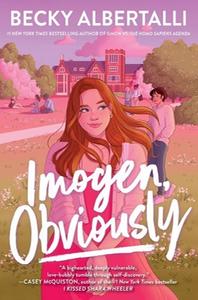
 Becky Albertalli (Simon vs. the Homo Sapiens Agenda; Kate in Waiting) is known for her warm and insightful stories about queer teenagers finding self-acceptance and first love. Her sixth solo novel, Imogen, Obviously, is both a sparkling romance and a moving account of a young woman's very contemporary bisexual awakening.
Becky Albertalli (Simon vs. the Homo Sapiens Agenda; Kate in Waiting) is known for her warm and insightful stories about queer teenagers finding self-acceptance and first love. Her sixth solo novel, Imogen, Obviously, is both a sparkling romance and a moving account of a young woman's very contemporary bisexual awakening.
Eighteen-year-old Imogen Scott is "hopelessly, blindingly, obviously straight." She tries her best to be a "capital-A Ally" to her friends and queer younger sister but is nervous about visiting her "Brazilian pansexual" friend, Lili, at college. Lili further complicates matters by revealing that she told her new, cool queer friends that she and Imogen used to date. Although Imogen is nervous, she agrees to pretend to be Lili's bisexual ex for the weekend. Then Imogen meets dark-haired lesbian Tessa, who has "Winona Ryder eyes" and "Clea DuVall freckles" and feels an instant attraction. A single weekend makes Imogen question if her sexuality might not be so obvious after all.
Imogen is anxious and introspective, and her development of a greater sense of self-confidence feels both satisfying and earned. Her electric chemistry and easy rapport with Tessa create an engrossing whirlwind romance, even as much of the story takes place inside Imogen's head. Albertalli beautifully describes the experience of falling in love for the first time--"it's like daybreak" for Imogen when she and Tessa make eye contact.
Imogen, Obviously portrays the Internet era nature of discrimination against bisexual women through the eyes of one such young woman. Imogen knows that her doubts about her sexuality are "what internalized biphobia sounds like": What if she is a "pick-me straight girl appropriating queerness" for attention? "If I were queer," she wonders, "wouldn't I at least sort of know?" Albertalli gives equal time and depth to Gretchen, Imogen's bisexual friend who has a rigid understanding of Imogen as "the token straight." Gretchen is a complex character and Albertalli ensures that readers understand how Gretchen's own traumatic experiences with discrimination shape her callous dismissal of Imogen's feelings.
Albertalli empathetically considers the nuance of queer identity and the harm caused by gatekeeping who is allowed to identify as LGBTQ+. As Imogen says, "no two people seem to do queerness in the same way." Imogen, Obviously is a deeply personal novel about queerness in all its colorful complexity and a rallying cry to "hold space for variation" in the LGBTQ+ community. --Alanna Felton, freelance reviewer
Shelf Talker: A teenage girl falls in love during a weekend college visit and begins to question the assumptions she holds about her sexuality in this stirring YA contemporary novel.

